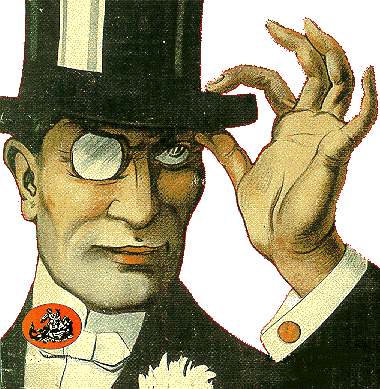Do not believe, my readers (all two of them), that life cannot be worth living, books worth reading, mysteries to solve. Ahh, mysteries to solve. There are always new mysteries to solve created by the brilliant minds of writers, my favorites being Doyle, Christie, and Chesterton, English all of them. Through a small amount of research on the vast wide internet, I attempted to widen my perspective on mystery writers in the early 20th Century (the jury is still out on more contemporary fare). It is in this search that I find a Frenchman, a Frenchman! A Frenchman can write mysteries. Of course, they can. Right? Mysteries deal with the sin of man, most notably theft and murder. Frenchman, indeed, are very familiar with personal sin. This Frenchman was Maurice LeBlanc.
Being a true Frenchman, a man who despises things English, including its language, people and cultural descendants, or so I hear, he crafts his protagonist as an antagonist, indeed a French twist. His detective is a thief. His thief is a gentleman. A kindly, suave Frenchman of keen intellect with a vast number of connections named Arsene Lupin is the antagonizing protagonist of LeBlanc. Lupin is a curious character. He is a sort of intellectual vigilante, using his mind and panache to help those who are in need. Batman seems to be an intellectual descendant of Lupin. Lupin doesn't have the physicality of Bruce Wayne, but certainly the detective prowess and brains. Anyway, I digress.
The name of this work I read is The Blonde Lady, which is a series of short stories about Lupin's exploits with the French police and Holmlock Shears chasing along the unifying clue of the mysterious Blonde Lady accomplice. I must digress again. Why Holmlock Shears and not Sherlock Holmes? This apparently is LeBlanc's second work with Lupin and Sherlock Holmes was his adversary. Being that Doyle was still alive and being Doyle, he forbid LeBlanc by force of law from using his intellectual property, especially when Lupin outwits Holmes.
LeBlanc does a great job creating meaningful and enjoyable characters. The plots move along quite well and the matching of wits between Lupin and Holmes/Shears makes for a great read. Watson/Wilson because the comedic relief of the stories constantly falling into mistreatment by his weak wits.
It all brings up a philosophical and moral question inside of me. Can a thief be a gentleman? A gentleman is an image of moral uprightness and for all his panache moral uprightness is not how Lupin goes about his business. I think a character like him belies of the change happening in the culture due to the last 200 years of philosophical theory and cultural distancing from Christian ideals. A gentleman can be a thief is a contradiction in terms and know doubt LeBlanc plays on that, but despite his clever title Lupin is nothing more than a man who does not respect law, even if faulty in it execution. He takes the law into his own hands and cleverly enacts his own sense of justice. He is the arbiter. God, the divine judge, and from whom all laws derive, has no say on the matter. Lupin is a true humanist in this sense. "Man is the measure of all things."
I listened to the audiobook from the great service of Libirvox. Support them. It is such a great resource for audio version for books no longer under copyright. Check them out.

No comments:
Post a Comment